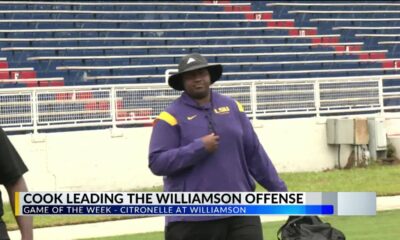Mississippi Today
PSC axes solar programs in light of EPA funds, advocates file lawsuit
Advocates from some of the state’s conservation groups — such as Audubon Delta, Mississippi Sierra Club and Steps Coalition — spoke out Wednesday against a recent decision by the Mississippi Public Service Commission to suspend several solar programs, including “Solar for Schools,” less than two years after the previous commission put them in place.
“This is particularly disappointing because the need for these incentives in the state of Mississippi is significant,” said Jonathan Green, executive director of Steps Coalition. “Energy costs in the South, and in particular the region known as the Black Belt, are higher than those in other parts of the country for a number of reasons. These regions tend to have older energy generation infrastructure, and housing that has not been weatherproofed to modern standards. For many low- to moderate-income residents in the state of Mississippi, energy burden and energy insecurity represent real daily economic challenges.”
The PSC voted 2-1 at its April docket meeting to do away with the programs, reasoning in part that new funds through the Inflation Reduction Act would be available to the state. About 10 days later, the Environmental Protection Agency awarded $62 million to the state, through the Hope Enterprise Corporation, to help low-income Mississippians afford adding solar power to their homes. The funds are part of the Biden Administration’s Solar for All program, one of the several recent federal initiatives aimed at reducing greenhouse gas emissions.
The PSC decision ended three programs the previous commission put in place to encourage wider adoption of solar power through the two power companies it regulates, Entergy Mississippi and Mississippi Power: “Solar for Schools,” which allowed school districts to essentially build solar panels for free in exchange for tax credits, as well as incentives for low-income customers and battery storage.
Last Friday, the Sierra Club filed lawsuits in chancery courts in Hinds and Harrison counties against the commission, arguing the PSC broke state law by not providing sufficient reasoning or public notice before making the changes. Advocates also argued that new funding going to Hope Enterprise won’t go as far without the PSC’s low-income incentives.
The programs were part of a 2022 addition to the state’s net metering rule, a system that allows homeowners to generate their own solar power and earn credits for excess energy on their electric bills. Mississippi’s version is less beneficial to participants than net metering in most states, though, because it doesn’t reimburse users at the full retail cost. Mississippi’s net metering program itself is still in tact.
Northern District Commissioner Chris Brown said that, while he supported efforts to expand solar power, he didn’t think programs that offer incentives from energy companies were fair to other ratepayers.

“It’s the subsidy that we take issue with,” Brown said at the meeting. “It’s not the solar, it’s not the helping the schools. We just don’t think it’s good policy to spread that to the rest of the ratepayers.”
Brown and Southern District Commissioner Wayne Carr voted to end the programs, while Central District Commissioner De’Keither Stamps voted against the motion. All three are in their first terms on the PSC. Brown’s position is in line with what the power companies as well as Gov. Tate Reeves have argued, which is that programs like net metering forces non-participants to subsidize those who participate.
Robert Wiygul, an attorney for the Mississippi Sierra Club, countered that argument during Wednesday’s press conference, saying that net metering actually helps non-participants by adding more power to the grid and reducing the strain on the power companies’ other infrastructure. Moreover, he said, the PSC hasn’t offered actual numbers showing that non-participants are subsidizing the program.
“Look, if the commission wants to talk about that, we are ready to talk about it,” Wiygul said. “But what we got here is a situation where these two commissioners just decided they were going to do this. We don’t even know what that claim is really based on because it hasn’t been through the public notice and hasn’t been through the public comment process.”
While no schools had officially enrolled in “Solar for Schools,” which went into effect in January of last year, Stamps told Mississippi Today that there were places in his district getting ready to participate in the very programs the PSC voted to suspend.

“My issue was we should have talked to the entities that were going through the process to (understand what they were doing) to participate in the programs before you eliminate the programs,” he said.
Several school districts in the state are already using solar panels thanks to funding from a past settlement with Mississippi Power. Officials there told Mississippi Today that the extra power generated from the panels has freed up spending for other educational needs. During the public comment period for the 2022 net metering update, about a dozen school district superintendents from around the state wrote in to support the initiative. Ninety-five school districts in the state would have been eligible for the program because they receive power from Entergy Mississippi or Mississippi Power.
Former commissioner Brent Bailey, who lost a close reelection bid in November to Stamps, was an advocate for the schools program that the PSC created while he was there. At the April docket meeting, he pleaded with the new commission to reconsider, arguing that the new federal funding won’t have the same impact without those programs.
“My ask is to at least give this program a chance, see where it goes, and hear from stakeholders that have participated,” Bailey said. The solar programs, he added, weren’t just about expanding renewable energy, but taking advantage of a growing economy around solar power as well: “We can just stand by and watch it go by, or we can participate in this and bring economic development to the state.”
This article first appeared on Mississippi Today and is republished here under a Creative Commons license.
Mississippi Today
AT&T, union reach deal ending strike
AT&T workers are back on the job today after the company reached a tentative agreement with the Communications Workers of America to end a month-long strike in the Southeast.
The new deal includes a 19.33% pay increase for all workers, and more affordable healthcare premiums.
Wire technicians and utility operations employes get an extra 3% pay increase.
In a statement, CWA president Claude Cummings Jr. praised the solidarity of the striking workers.
“I believe in the power of unity, and the unity our members and retirees have shown during these contract negotiations has been outstanding and gave our bargaining teams the backing they needed to deliver strong contracts,” he said.
CWA district president Jermaine Travis told Mississippi Today that he and his coworkers are happy to be back at work.
“It’s been a long month, so everybody is excited to get back to work and get back to taking care of business,” he said.
Travis also noted the significance of the strike, the longest telecommunications strike in the Southeast.
“I think we’re gonna look back at this strike, at this moment in history, and see it was really important for workers to stand up for the rights and force companies to do right by them, so I think we did a good thing,” he said.
AT&T has also reached a tentative agreement with the CWA in the West.
“As we’ve said since day 1, our goal has been to reach fair agreements that recognize the hard work our employees do to serve our customers with competitive market-based pay and benefits that are among the best in the nation — and that’s exactly what was accomplished,” AT&T said in a released statement. “These agreements also support our competitive position in the broadband industry where we can grow and win against our mostly non-union competitors.
This article first appeared on Mississippi Today and is republished here under a Creative Commons license.
Mississippi Today
On this day in 1925
Sept. 16, 1925

“The King of the Blues” was born Riley B. King on a plantation near Itta Bena, Mississippi, the son of sharecroppers.
While singing in the church choir, he watched the pastor playing a Sears Roebuck guitar and told the preacher he wanted to learn how to play. By age 12, he had his own guitar and began listening to the blues on the radio. After playing in churches, he went to Memphis to pursue a music career in 1948, playing on the radio and working as a deejay who was known as “Blues Boy” and eventually “B.B.”
Within a year, B.B. King was recording songs, many of them produced by Sam Phillips, who later founded Sun Records. In 1952, “3 O’Clock Blues” became a hit, and dozens followed.
While others sought to bring change through the courts, King did it through music. The songs that he and other blues artists created drew many listeners across racial lines. One of the biggest fans walked into the studio one day and called him “sir.” His name? Elvis Presley, whose first big hit was the blues song, “That’s All Right, Mama.”
King explained that music was like water — something “for every living person and every living thing.” His smash hit, “The Thrill Is Gone,” made him an international star and led to collaborations with some of the world’s greatest artists.
He survived a fire that almost burned up his beloved guitar, “Lucille,” and won 18 Grammys as well as a Grammy Lifetime Achievement Award. In 1987, he was inducted into the Rock & Roll Hall of Fame. Both Time and Rolling Stone magazines ranked him as one of the greatest guitarists of all time.
In 2006, he received the Presidential Medal of Freedom, the greatest civilian honor. Two years later, his hometown of Indianola honored him by opening the B.B. King Museum and Delta Interpretive Center. After he died in 2015, thousands flocked to the Mississippi Delta for the wake and funeral.
“Hands that once picked cotton,” the preacher told the crowd, “would someday pick guitar strings on a national and international stage.” He performed till the end, telling Rolling Stone in 2013 that he had only missed 18 days of performing in 65 years. He died two years later at 89 after battling diabetes for decades.
This article first appeared on Mississippi Today and is republished here under a Creative Commons license.
Mississippi Today
Podcast: Sen. David Blount discusses tax cuts, retirement system, mobile sports betting
State Sen. David Blount sits down with Mississippi Today’s Bobby Harrison and Adam Ganucheau to discuss the push for income tax elimination and how that would affect the state’s budget. He also talks about needed funding for the state’s troubled retirement system and whether Mississippi will soon adopt mobile sports betting.
READ MORE: As lawmakers look to cut taxes, Mississippi mayors and county leaders outline infrastructure needs
The post Podcast: Sen. David Blount discusses tax cuts, retirement system, mobile sports betting appeared first on Mississippi Today.
-
Mississippi News Video6 days ago
Starkville apartment complex resident holds Bible study in the wake of violence
-
Mississippi News Video3 days ago
Woman arrested after reposting school threat in Calhoun County
-
News from the South - Tennessee News Feed6 days ago
Mother outraged after she says son attacked by former Mississippi middle school coach
-
News from the South - Louisiana News Feed3 days ago
Food drive underway for Hurricane Francine victims in Kenner
-
News from the South - Alabama News Feed6 days ago
Former Vigor coach Markus Cook making big impact at Williamson
-
Crooked Letter Sports Podcast5 days ago
Podcast: The Clevelands pay tribute to native Mississippian James Earl Jones and also discuss a full weekend of football, from high schools to the NFL.
-
Local News5 days ago
Schedule changes due to potential impacts from Francine
-
News from the South - Kentucky News Feed6 days ago
Anderson County school evacuated after bomb threat












































